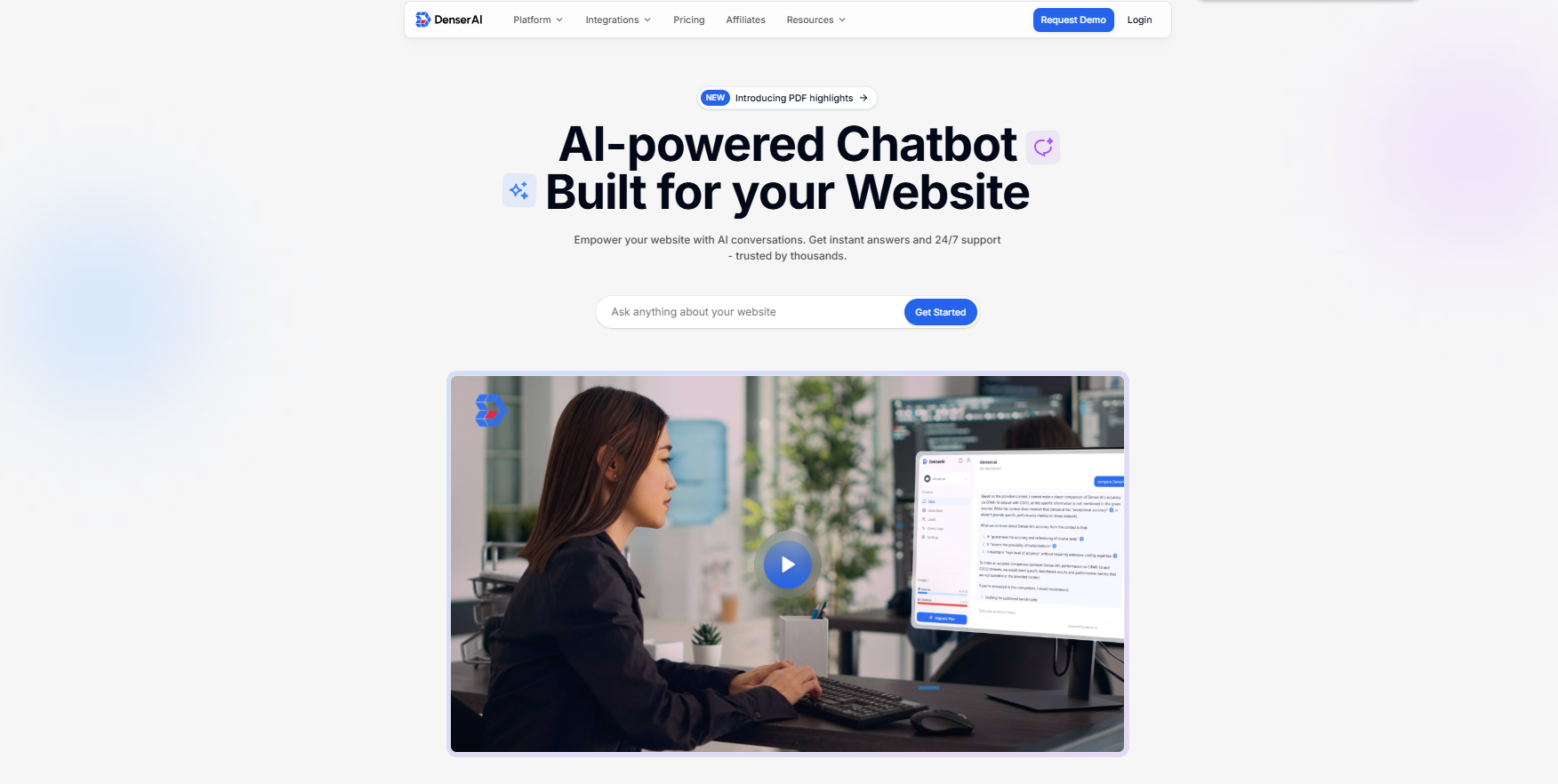
10 Best AI Agents for Customer Service in 2025

As customers expect faster responses and more personalized support, businesses are turning to specialized AI agents to deliver consistent service.
AI agents can recognize customer intent, handle complex workflows, and pull relevant information from CRMs, help desks, or knowledge bases in real time.
But with so many options on the market, choosing the right one can be challenging. Each platform brings its own strengths, some offer fast setup, others focus on customization or deeper integrations.
In this article, we’ll take a closer look at the top AI agents for customer service in 2025, what they’re designed for, and how they can support your team’s goals. If you're evaluating AI chatbot solutions to improve your support operations, this guide will help you find the right fit.
Why Use AI Agents in Customer Service?#
If you’re leading a support team or managing a growing business, you know how hard it is to keep up with customer expectations. People want fast replies, real answers, and friendly service.
This is where AI customer service tools can help you. They are becoming a basic requirement to keep up with demand.
Understand Context, Not Just Keywords#
Traditional chatbots rely on rules. You set up question-and-answer pairs, and the chatbot follows them. If a customer phrases something differently than expected, the chatbot often fails to respond correctly.
AI agents for customer service use AI systems. They don't just match keywords but rather understand meaning, intent, and the full context of a question. Your customers don't need to ask things in a specific way for the AI to figure it out and answer customer queries.
Learn Over Time#
A traditional chatbot stays the same unless you manually update it. If it gives a bad answer, it will keep doing so. That’s time-consuming and limits how much it can actually help.
AI agents improve automatically. They learn from customer behavior, successful replies, and failed interactions. With every conversation, they get better at automating complex tasks that reduce mistakes and give your team more time to focus on complex issues.
Work Across Channels#
Most chatbots are limited to a single platform, usually your website chat. When a customer moves from live chat to email or voice, the chatbot can’t follow the conversation.
AI agents are different as they work across platforms like email, voice, chat, and even social messaging tools. If your customer starts on one and finishes on another, the AI still remembers who they are and what the issue is.
This flexibility is vital for modern contact center operations, where transitions between channels can shape the overall experience.
Personalize Responses#
A chatbot treats every customer the same. It can’t pull up past orders or know if the person it's talking to is new or returning, which makes the experience feel generic.
AI agents personalize the conversation. They access customer data, review past conversations, and adjust the response based on the customer’s profile.
AI-based personalization supports stronger customer retention, since it builds a consistent and relevant experience each time someone reaches out.
Help Your Team Work Smarter#
With traditional bots, your team still needs to handle most tickets manually. The bots might deflect a few simple questions, but they can’t really manage the workload.
AI agents can handle full conversations, create custom reports, tag issues based on content, and assign tickets to the right team members.
This reduces routine tasks and lets your support team focus on higher-level work. It also gives you a better view of where the AI performs well and where improvements are needed.
10 Best AI Agents for Customer Service in 2025#
The right AI agent can completely change how you handle support. If you're running a business and want to improve response times and support customers around the clock, the following platforms stand out.
1. Denser.ai#
DenserBot is the AI chatbot solution offered by Denser.ai, focused on easy deployment of custom AI support bots for websites and apps. It allows you to create a custom-built AI chatbot that is powered by your data.

You can feed it your website content, knowledge base articles, PDF manuals, or even external data from Google Drive. The platform will automatically train an AI to answer questions based on that content. This process is automated and requires no coding.
The strength of DenserBot’s approach is in using retrieval-augmented generation (RAG). When a customer asks something, the bot retrieves the relevant snippet from your documents and formulates the answer using that snippet. This ensures accuracy and the ability to point to source info.
In fact, Denser.ai includes a feature for PDF highlighting, where the bot’s answer will highlight the exact section of a PDFor text that contains the answer, adding transparency to the responses.
DenserBot is also valued for its flexibility and integration options. You can deploy AI agents on your website with a chat widget and integrate them with other platforms through APIs or external systems.
There’s even a native integration for Shopify, which makes it popular for frontline support in e-commerce. It can answer product questions and assist with orders on Shopify stores.
The chatbot’s look and feel are fully customizable to match your brand’s style, and you can configure multiple AI agents if needed. 24/7 availability is a given where customers can get answers anytime.
Try Denser for free or schedule a product demo now!
2. Zendesk AI#
Zendesk AI integrates advanced AI capabilities into its customer service software, enhancing both self-service and agent-assisted interactions. Its AI agents autonomously resolve complex issues across multiple channels, which provides 24/7 support that reduces the burden on customer support teams.
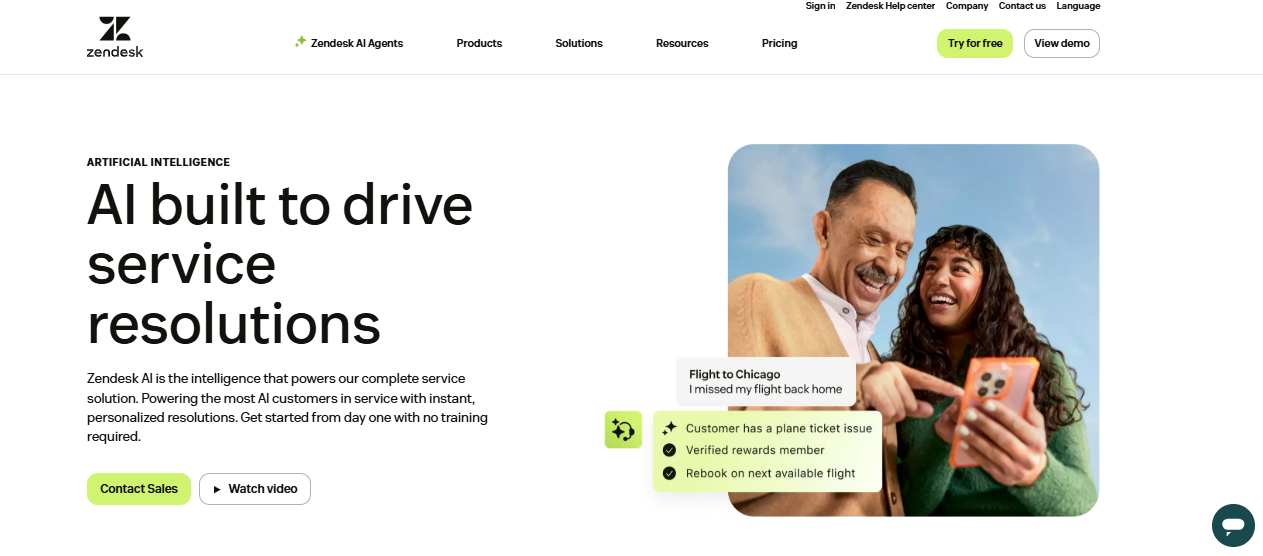
Image Source: zendesk.com
The platform's Copilot tools assist agents by auto-triaging tickets based on intent and sentiment, suggesting appropriate responses, and adjusting reply tones to match customer expectations. This improves agent efficiency and ensures consistent communication.
Zendesk AI learns from your existing knowledge base and past interactions, which offers reliable recommendations and AI-powered insights. Administrators can analyze customer data through dashboards to identify key insights and optimize business operations.
3. Intercom Fin#
Intercom has an AI-powered customer service called Fin, designed to deliver human-like interactions across various channels, including chat, email, voice, and social media.
Fin uses advanced AI models powered by machine learning to understand and respond to customer inquiries accurately, learning from your help center articles, FAQs, and policies.
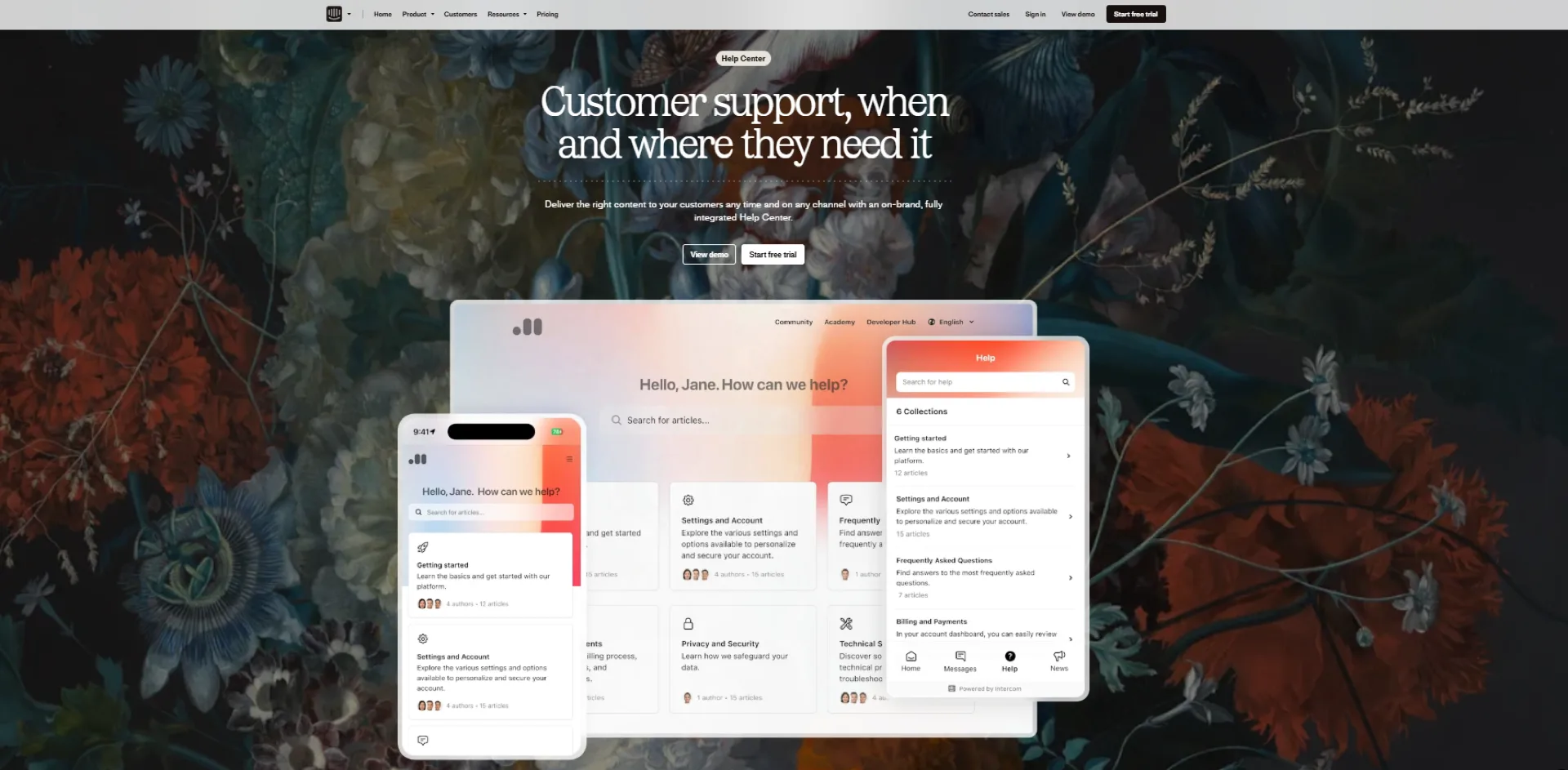
Image Source: intercom.com
Fin operates continuously, handling repetitive tasks and escalating complex issues to human agents when necessary. Its behavior is customizable to align with your brand's tone and business rules.
Fin's integration capabilities allow it to work with platforms like Zendesk and Salesforce, making it a flexible addition to your existing support stack and a dependable AI partner.
4. Freshdesk Freddy AI#
Freshdesk's Freddy AI suite offers both autonomous support agents and AI copilots to enhance customer service.
The Freddy AI Agent can be deployed quickly without coding, learning from your company's documents and knowledge base to handle common inquiries. It supports multiple channels and languages, providing personalized assistance around the clock.
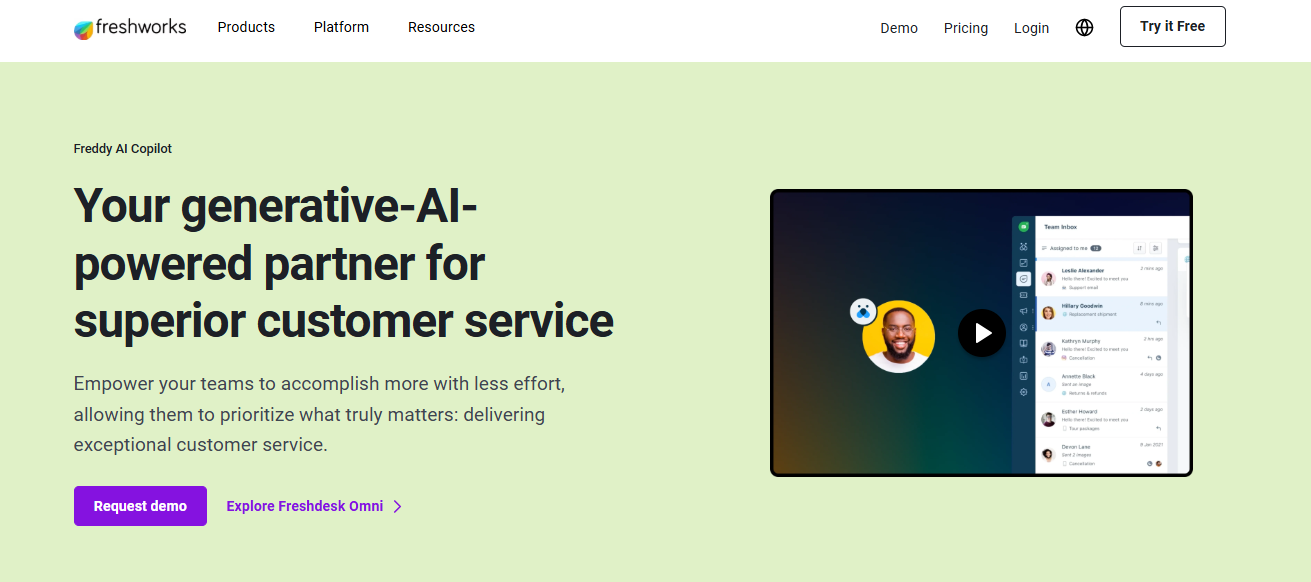
Image Source: freshworks.com
For live agents, Freddy AI Copilot serves as a productivity booster by summarizing tickets, suggesting responses, and adjusting reply tones. It performs customer sentiment analysis to prioritize customer issues and guides agents in handling them empathetically with built-in technical expertise.
5. Salesforce Einstein#
Salesforce's Einstein AI integrates generative and predictive analytics into the Service Cloud platform, enabling autonomous handling of customer inquiries across various channels.
Einstein AI bots can process rich media inputs and transfer complex issues to human agents with full context. The AI uses your CRM data to provide accurate and personalized responses.
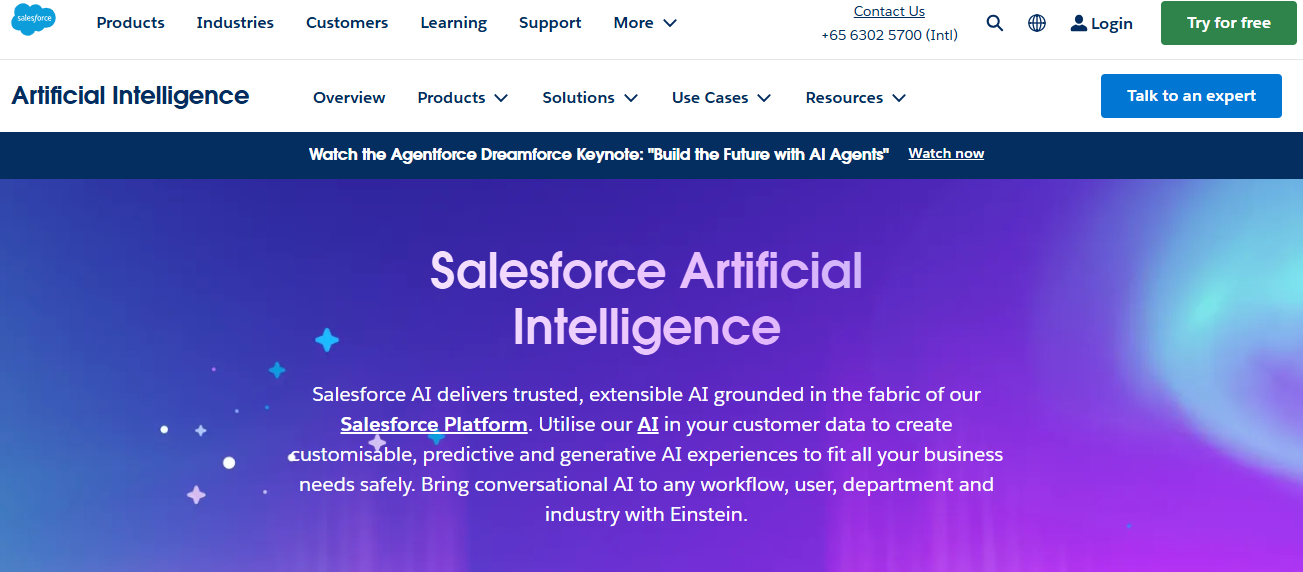
Image Source: salesforce.com
For agents, Einstein assists by generating reply drafts, case summaries, and knowledge articles within the agent console. It offers next-best action recommendations based on predictive models trained on your CRM data.
6. Ada#
Ada is an AI-powered customer service automation platform that offers a highly autonomous chatbot capable of resolving a significant portion of customer inquiries without human intervention. It connects to your existing knowledge bases and internal documents to handle questions in multiple languages.
Ada's Reasoning Engine enables the bot to perform actions across systems via integrations, such as updating orders or checking account statuses.
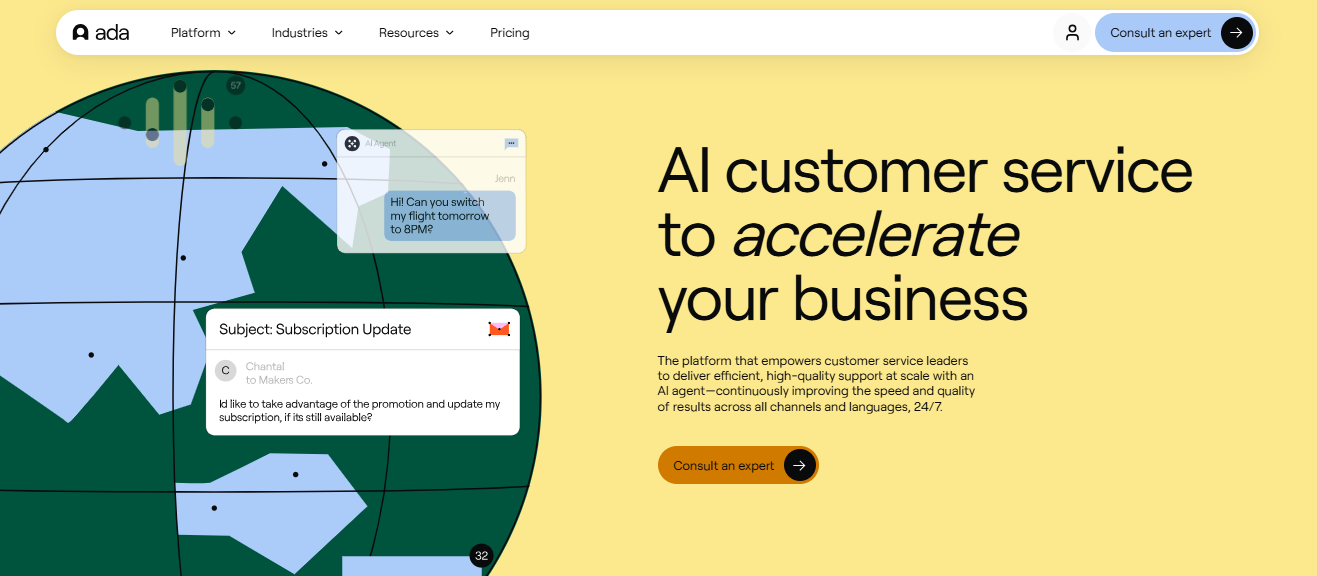
Image Source: ada.cx
It supports omnichannel interactions, including chat, email, SMS, and voice calls, and is also capable of building AI agents that handle high-volume requests across industries.
The platform provides tools for support teams to coach the AI agent, ensuring continuous improvement and alignment with your business processes.
7. Forethought#
Forethought offers a comprehensive AI solution for support teams, centered around its AI-powered virtual agent, Solve. Solve can handle a high volume of support tickets across chat, email, and voice channels by detecting customer intent and retrieving answers from your knowledge base.
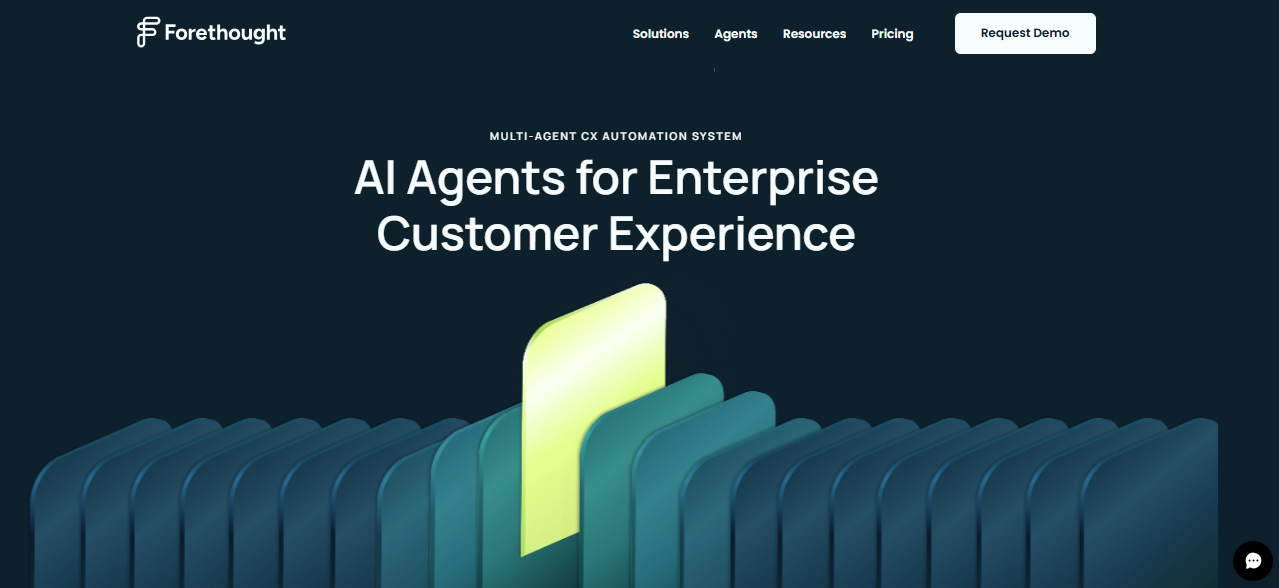
Image Source: forethought.ai
Forethought's platform includes additional AI modules like Triage, which auto-tags and prioritizes incoming tickets. The Assist feature provides agents with relevant knowledge article suggestions and draft responses. These features support smarter data collection and decision-making.
These features integrate with popular helpdesk systems that boost agent performance and speed up support processes.
8. IBM AI Agents#
IBM's AI agents, powered by the Watsonx platform, are designed to improve customer service by automating interactions across multiple channels, including web, mobile, voice, and messaging platforms.
The AI agents use natural language understanding to provide accurate answers from your knowledge sources, including FAQs and past tickets.
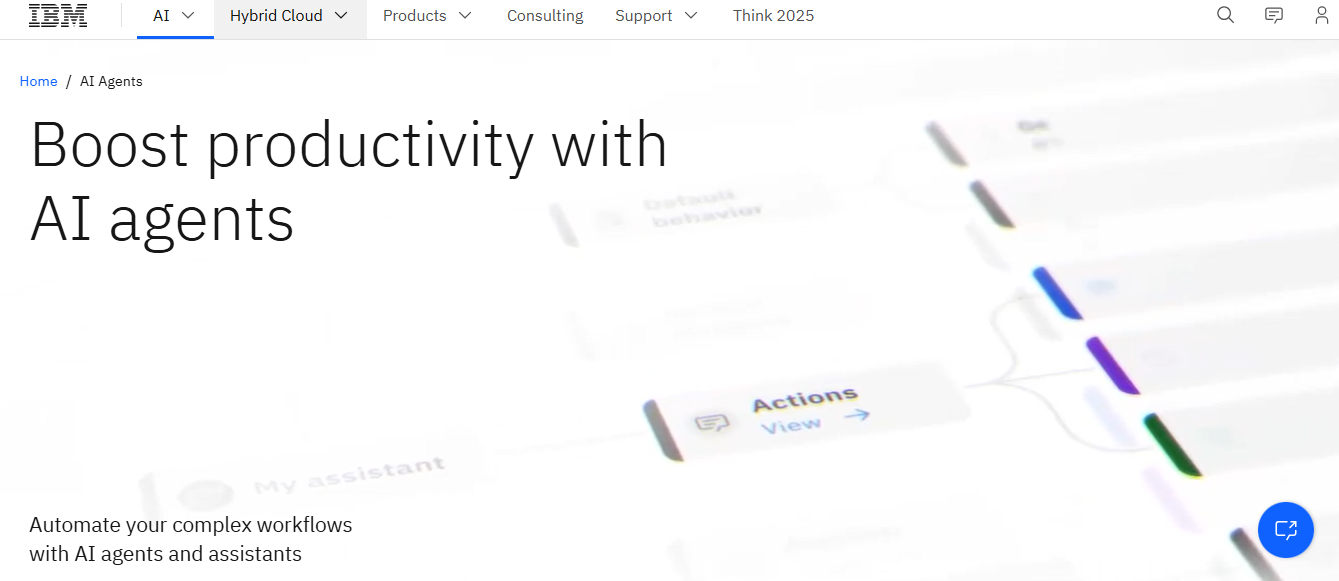
Image Source: ibm.com
A key feature of IBM's AI agents is their integration with over 80 enterprise applications, which allows for simplified workflows and data access. The no-code interface of Watsonx Orchestrate enables businesses to customize and deploy AI agents quickly.
9. Tidio Lyro#
Lyro by Tidio is a conversational AI chatbot designed for small and mid-sized businesses to automate customer support. Powered by a large language model and Tidio's proprietary natural language processing (NLP), Lyro understands customer queries and provides human-like responses.
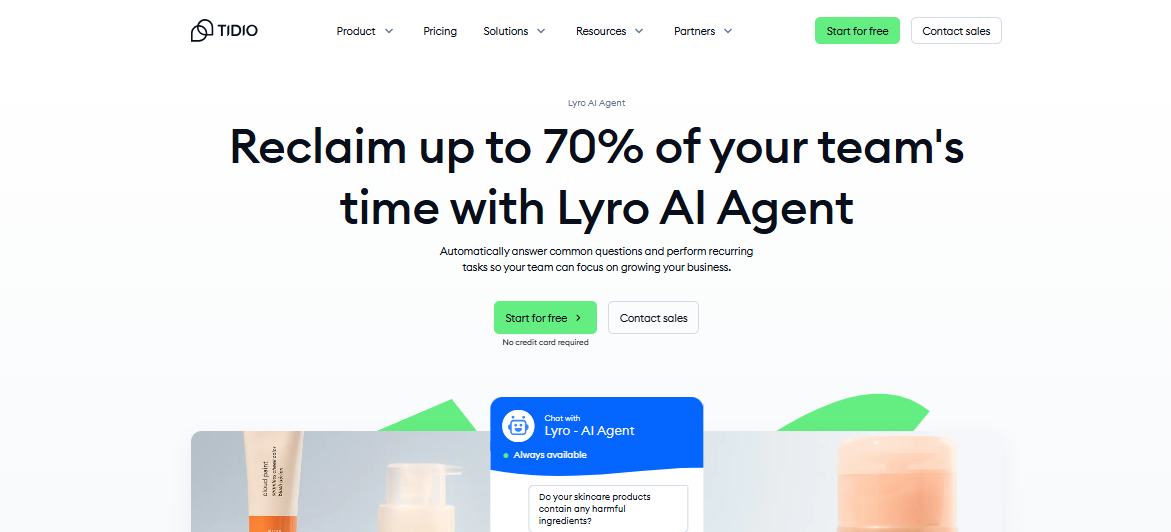
Image Source: tidio.com
Lyro is easy to deploy, requiring no training from your side. It connects to your existing support content and starts answering questions immediately, adhering strictly to your provided information. It also benefits from computer vision capabilities for media-based support.
It supports multiple languages and integrates with various support tools, offering an accessible AI-powered chatbot for boosting customer relationships.
10. Zoho Zia#
Zia is Zoho's AI assistant that functions as a powerful AI agent within Zoho Desk. It combines traditional AI capabilities like sentiment analysis and ticket classification with generative AI features to assist both customers and support agents.
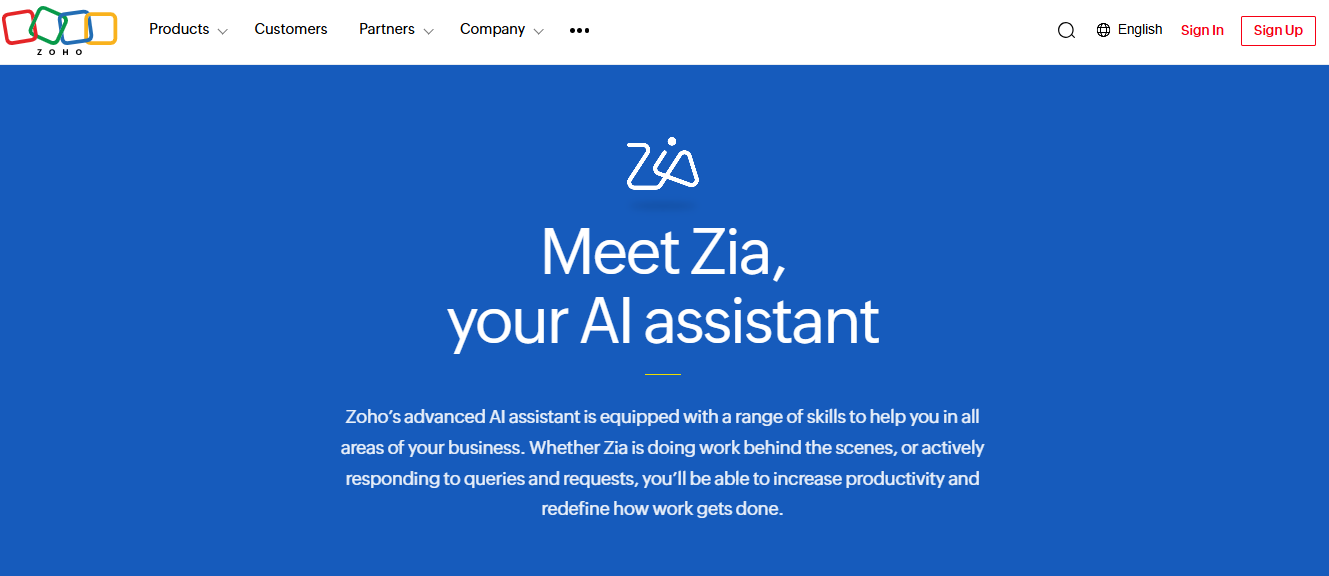
Image Source: zoho.com
For customer self-service, Zia uses your knowledge base and past tickets to answer questions automatically. It also integrates with Microsoft Teams to support internal collaboration and faster response handoffs.
It can generate conversational answers and personalize responses based on customer sentiment. For agents, Zia provides contextual ticket summaries and reply suggestions, enhancing efficiency and consistency in customer support.
How to Choose the Right AI Customer Service Agent#
The right AI customer service agent should be about how those features work for your team, your system, and your goals. Below are key points to help you make a smart decision that actually improves your support, rather than adding more work.
Consider Your Business Size and Support Volume#
Start by looking at how many customers you serve and how often they reach out. If you’re a small business with under 100 tickets per week, you don’t need the same system that a global enterprise does.
Some platforms are built for high-volume, enterprise-grade usage, while others are optimized for lean support teams. Understanding your current workload and projected growth will help narrow your options to those best aligned with your support requirements.
Check Integration Options With Your Current Stack#
An AI agent should work with the systems already in place. Whether you rely on a CRM, ticketing system, live chat platform, or internal knowledge base, the AI tool has to connect smoothly.
Integration gaps can lead to inefficiencies, duplicated effort, and disjointed customer experiences. Make sure the agent offers built-in integrations or open APIs compatible with your current tools and processes.
Evaluate Training and Customization Features#
You want control not just over the content, but over how the AI responds. Some solutions allow extensive customization and content control, while others offer limited flexibility.
If your support strategy involves a specific brand voice or detailed customer journeys, choose a platform that allows you to adjust these settings without technical barriers.
You should also review how quickly the AI can be trained using your existing data sources. Faster training reduces onboarding time and accelerates value for teams with limited software development support.
Compare Pricing and Support Models#
Not all pricing structures are alike. Some AI platforms charge per conversation, others offer subscription-based models with feature tiers.
You need to consider how the pricing model aligns with your support volume and budget. Equally important is the level of customer support provided by the vendor.
Also, determine if you will have access to onboarding assistance, dedicated account managers, or 24/7 technical support during critical implementation stages.
Some platforms even allow you to send proactive messages to engage users before issues arise, which can reduce long-term ticket volume.
Trial Periods and Scalability#
Finally, look for platforms that offer trial periods or pilot programs. Testing the solution with your real customer data and live workflows can reveal how well the AI agent performs in practice.
As your business grows, will the system continue to support increasing volume and complexity?
The ideal AI solution should be flexible enough to evolve with your needs without requiring costly transitions or platform changes. You need to make sure you can track performance over time with clear data analytics tools built into the platform.
Common Use Cases of AI Agents in Customer Support#
AI agents are no longer limited to just answering basic questions. They’re now capable of managing a broad range of support tasks that were once handled exclusively by humans.
Below are some of the most valuable AI use cases where agents are actively improving customer service workflows across industries.
Answering Frequently Asked Questions#
One of the most immediate and impactful uses of AI agents is automating responses to commonly asked questions. These might include inquiries about store hours, subscription plans, shipping timelines, pricing, or return policies.
Instead of assigning these repetitive questions to your support staff, AI agents can provide quick, accurate replies based on your knowledge base or help center. This frees up your team to focus on more pressing or complex issues, while customers receive consistent, instant answers at any time of day.
Handling Product Returns and Order Status#
AI agents are well-suited to manage order-related interactions. Customers often reach out to track packages, request returns, or cancel items.
With access to your backend systems or order databases, the AI can provide real-time updates and walk users through the next steps without any human involvement.
For businesses in retail or e-commerce, this reduces the volume of tickets and makes sure customers aren’t left waiting for routine information that could otherwise clog your queue.
Resolving Technical Issues#
When integrated with system diagnostics or product knowledge, AI agents can guide customers through troubleshooting steps. This is helpful in SaaS or hardware-based industries where setup or usage errors are common.
The AI can detect keywords and phrases that signal a technical problem, then pull the correct workflow or guide from internal documentation to walk the customer through a resolution.
If the problem is too complex, the AI can still gather the needed details and pass them to your team for a quicker resolution.
Upselling and Cross-Selling During Support#
AI agents can also play a proactive role during service conversations by identifying opportunities to recommend additional products or upgrades.
If a customer is asking about features, pricing tiers, or compatibility, the AI can suggest the next best product or service based on their query and history.
This creates new sales opportunities without needing a sales rep to intervene, and can contribute to higher revenue per customer when integrated with your CRM or purchase history tools.
Gathering Customer Feedback#
Capturing feedback is essential for improving your service, but it often goes overlooked or becomes a manual task. AI agents can be programmed to ask for quick feedback after resolving an issue or completing an interaction.
They can log responses directly into your reporting tools and even categorize the sentiment or satisfaction level. It allows your team to monitor trends in customer preferences and adjust support strategies accordingly.
Routing Tickets to Human Agents#
Even the best AI agents can’t handle everything. When a question is outside the AI’s scope, such as account security issues, legal inquiries, or highly emotional complaints, the system should know when to hand off the case.
With intelligent routing, the AI assigns the ticket to the correct department or rep, along with context from the conversation. This makes transitions seamless and reduces time spent gathering information a second time.
Launch Your Custom AI Support Agent in Minutes With Denser.ai!#
Unlike one-size-fits-all solutions, DenserBot is built to adapt to your unique content, brand voice, and support goals without the complexity.
With Denser.ai, you can launch AI support agents in minutes by uploading content from your website, PDFs, knowledge base, or help center. The bot uses RAG to pull from verified sources and answer customer questions with full transparency.
It works 24/7, integrates with popular tools, and gives you control over how it looks, responds, and evolves over time.
If your business is ready for a smarter way to manage customer service, Denser.ai is a reliable, low-maintenance solution that grows with you.
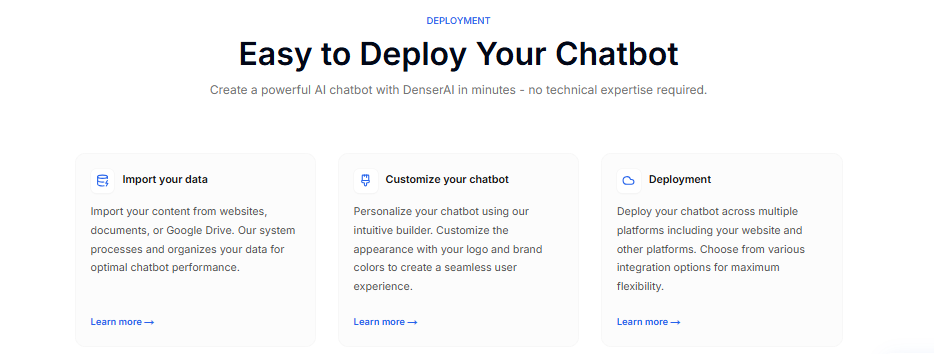
Sign up for a free trial or schedule a demo to see how DenserBot can reduce ticket volume and deliver the AI experience your customers expect.
FAQs About Top AI Agents for Customer Service#
What is the best customer service AI agent?#
It depends on what your business needs. Zendesk AI, Intercom Fin, and Freshdesk Freddy AI are good if you want full automation and already use those platforms.
DenserBot from Denser is an excellent option. It lets you train an AI agent using your own website, documents, or help center content, which makes it a powerful yet flexible choice if you want control without complexity.
What is the best AI tool for customer service?#
The best tool is the one that fits your current setup. Some, like Salesforce Einstein, work well for bigger teams with lots of data. Tools like Lyro and Ada are more suited for smaller teams that need quick deployment and accurate answers.
If your goal is to automate support using your own knowledge base, Denser offers a reliable, data-backed solution that scales as your customer base grows. The key is choosing a tool that fits your workflow, integrates with your systems, and reduces time spent on repetitive tasks.
Which company uses AI for customer service?#
Many well-known companies already use AI. Brands like Amazon, Zoom, and Shopify use AI to help with live chat, email replies, and product support. Smaller businesses also use tools like Zoho Zia or Forethought to keep up with customer requests without hiring more agents.
Can AI do customer service?#
Yes. AI can answer questions, track orders, fix simple problems, and even suggest products. It works 24/7 and gets better over time. While it won’t replace human reps for everything, it can help your team work faster and handle more requests.